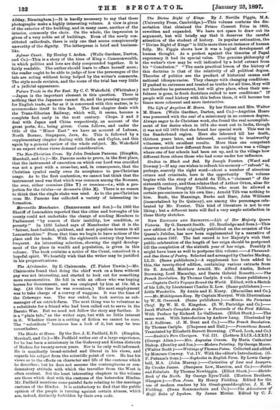The Divine Right of Kings. By J. Neville Figgis, M.A.
(University Press, Cambridge.)—This volume contains the dim- sertation that obtained the Prince Consort Prize in 1892, rewritten and expanded. We have not space to draw out its argument, but will briefly say that it deserves the careful attention of the student of history. In popular estimation, the "Divine Right of Kings" is little more than an instance of human. folly. Mr. Figgie shows how it was a logical development of human thought. As a protest against the theories of Papal supremacy it had its special value. The genuine philosophy of the writer's view may be well indicated by a brief extract from his "Conclusion." "The main practical lesson of the history of this doctrine is that of the relativity of all political dogma. Theories of politics are the product of historical causes and: national idiosyncrasies. They change with changing conditions.
If pushed to extremes and treated as truths for all time, tley will not therefore be permanent, but will give place, when their use- fulness is gone, to fresh doctrines suited to new conditions." If people will read history with this before them, it will become ten times more coherent and more instructive.


































 Previous page
Previous page